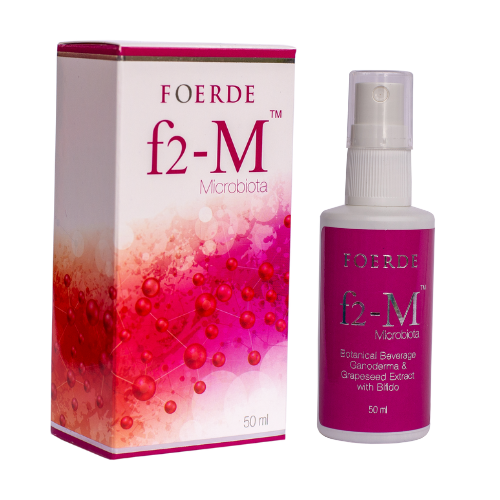My Store
Foerde f2-M Probiotic Spray
Foerde f2-M Probiotic Spray
Couldn't load pickup availability
Containing 33 live probiotic strains suspended in a uniquely formulated prebiotic liquid, Foerde f2m® Microbiota is a high-quality probiotic supplement, crafted to support your digestive system and skin microbiome. This premium German made supplement promotes gut health and overall wellness.
- 50 ml microbiotic spray
- Contains 33 live bacteria strains (aerobic and anaerobic)
- Suspended in prebiotic fluid consisting of 27 unique fermenting fruits/herbs
- Free from preservatives and synthetic flavours
- Certified Organic, Lactose-free, Gluten-free, Vegan
- Developed for oral ingestion and topical use on the skin
- Developed to support symptoms of IBS/Leaky gut by repairing the gut mucosal barrier
Each dose (1.5 ml) provides: f2M® microorganisms: 1.5 x 10^8 CFU*
See detailed ingredient list below
*Free Shippping on orders over $100*



Detailed Ingredient List
Prebiotic Solution
Water: Acts as a solvent in the product.
Cane Molasses & Cane Sugar: Serve as a nutrient source for the probiotic bacteria during fermentation.
Herbal and Plant Mix:
Pineapple: Contains bromelain, which aids digestion and reduces inflammation.
Angelica Root: Traditionally used to support digestive health and relieve bloating.
Aniseed: Known for its digestive benefits, particularly in reducing gas and bloating.
Basil: Has anti-inflammatory and antimicrobial properties that support overall gut health.
Dill Fruit: Helps in digestion and reduces bloating.
Fennel: Relieves gas and bloating and supports digestive health.
Blueberry Leaves: Rich in antioxidants, they help reduce inflammation and support overall health.
Raspberry Leaves: Known for their digestive and anti-inflammatory properties.
Ginger: Aids digestion and reduces nausea and inflammation.
Caraway: Helps in digestion and reduces bloating and gas.
Agrimony: Traditionally used for its anti-inflammatory properties.
Olive Leaves: Have antimicrobial and antioxidant properties.
Oregano: Known for its antimicrobial properties, it supports gut health.
Peppermint: Relieves digestive discomfort and reduces bloating.
Rosemary Leaves: Have antioxidant properties and support digestion.
Red Clover: Known for its anti-inflammatory effects.
Sage Leaves: Supports digestion and has antimicrobial properties.
Black Cumin Seeds: Known for their immune-boosting and anti-inflammatory effects.
Licorice: Supports digestive health and reduces inflammation.
Thyme: Has antimicrobial and digestive benefits.
Grape Seed Flour (OPC): Rich in antioxidants, supports cardiovascular health and reduces inflammation.
Reishi (Ganoderma lucidum): Known for its immune-boosting and anti-inflammatory properties.
Fermented Rice Bran, Papaya, Seaweed, Carrots, Turmeric:
Benefit: These fermented ingredients are rich in antioxidants, vitamins, and minerals. Fermentation enhances their bioavailability and supports gut health by promoting beneficial bacteria.
Microorganisms (Probiotic Strains)
Bacillus subtilis:
Supports immune function and gut health by producing enzymes that aid digestion. It also has antimicrobial properties that help balance the gut microbiome.
Bifidobacterium animalis:
Enhances digestion and supports the immune system by reducing inflammation in the gut. Commonly found in the intestines of mammals.
Bifidobacterium bifidum:
Aids in breaking down dietary fiber and produces vitamins. It helps maintain a healthy balance of gut bacteria and boosts immune function.
Bifidobacterium breve:
Improves digestion, particularly of fibers, and has anti-inflammatory effects. It also supports skin health by reducing atopic dermatitis.
Bifidobacterium longum:
Helps reduce gastrointestinal discomfort, such as bloating and gas. It also has immune-modulating effects and can reduce inflammation.
Bifidobacterium infantis:
Particularly beneficial for infants, it aids in the digestion of breast milk and supports immune development. It also reduces symptoms of irritable bowel syndrome (IBS) in adults.
Bifidobacterium lactis:
Enhances immune response, particularly in elderly people, and improves bowel regularity. It’s also known for its cholesterol-lowering effects.
Enterococcus faecium:
Promotes gut health by balancing the intestinal flora. It also has antimicrobial properties that help prevent infections.
Lactobacillus acidophilus:
One of the most widely used probiotics, it helps in breaking down lactose, improving digestion, and boosting immune health.
Lactobacillus amylolyticus:
Assists in starch digestion and supports a healthy balance of gut bacteria.
Lactobacillus amylovorus:
Known for breaking down complex carbohydrates and promoting gut health. It also has potential anti-inflammatory effects.
Lactobacillus bulgaricus:
Commonly used in yogurt, it helps in lactose digestion and supports overall gut health by maintaining the balance of good bacteria.
Lactobacillus casei (multiple strains: 01, 02, 03):
Known for its ability to survive the acidic environment of the stomach, it supports digestion and reduces symptoms of diarrhea and IBS.
Lactobacillus crispatus:
Promotes vaginal health by maintaining the balance of beneficial bacteria and reducing the risk of infections.
Lactobacillus delbrueckii:
Often used in dairy products, it supports lactose digestion and contributes to gut health.
Lactobacillus farraginis:
Supports gut health by breaking down fibrous material and balancing the gut microbiome.
Lactobacillus fermentum:
Known for its antioxidant properties, it helps reduce cholesterol levels and supports immune function.
Lactobacillus gasseri:
Promotes weight loss by reducing fat absorption and improving metabolism. It also helps in reducing inflammation and boosting immunity.
Lactobacillus helveticus:
Supports digestion, particularly of dairy products, and improves bone health by enhancing calcium absorption.
Lactobacillus johnsonii:
Boosts the immune system and helps in the prevention of gastrointestinal infections.
Lactobacillus paracasei:
Reduces inflammation and supports the immune system, particularly in managing allergies and eczema.
Lactobacillus parafarraginis:
Supports gut health by balancing the microbiome and aiding in the fermentation of fibrous material.
Lactobacillus plantarum:
Known for its antioxidant properties, it helps reduce inflammation, supports digestion, and improves skin health.
Lactobacillus reuteri:
Supports oral health by reducing harmful bacteria in the mouth. It also improves gut health and reduces symptoms of colic in infants.
Lactobacillus rhamnosus:
Well-known for its ability to reduce diarrhea, particularly in children, and support immune function. It also helps with the management of allergies.
Lactobacillus salivarius:
Supports oral health by reducing harmful bacteria in the mouth and helps in preventing gastrointestinal infections.
Lactobacillus zeae:
Contributes to gut health by aiding in lactose digestion and maintaining a balance of good bacteria.
Lactobacillus diacetylactis:
Commonly used in dairy fermentation, it supports digestion and contributes to gut health.
Lactococcus lactis:
Known for its role in dairy fermentation, it supports gut health and has antimicrobial properties that help balance the microbiome.
Saccharomyces cerevisiae:
A probiotic yeast that helps with digestion and supports immune function. It’s also known for reducing diarrhea, particularly in people taking antibiotics.
Streptococcus thermophilus:
Commonly used in yogurt production, it helps in lactose digestion and supports gut health by maintaining a balance of good bacteria.
Directions of Use
- General Use: Spray 5 times into your mouth, then wait for 15 seconds before drinking half a glass of water (about 100 ml). It's recommended to use the spray in the morning and/or at night before brushing your teeth.
- For Chronic Conditions (e.g., Inflammatory Bowel Disease): Spray 5 times into your mouth and drink water before each meal.
- Topical Use: For wounds caused by viral or bacterial infections, spray 2-3 times on the affected area, 3 times a day, until the wound heals.
- Storage: Store the product between 7°C and 30°C in a dry place, away from direct sunlight. After opening, it should be stored in the refrigerator.



